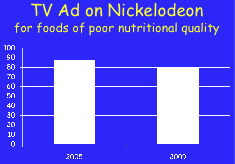Why marketing unhealthy food to children must stop
We are in the midst of a childhood obesity crisis.
 Childhood obesity rates have tripled since the 1980s. Currently, one in three children in the United States is overweight or obese and obese children and teenagers are more likely to become obese adults. Obesity increases the risk of developing heart disease, stroke, cancer, and diabetes. Being overweight in childhood is associated with low self-esteem, depression, stigma, teasing and bullying, and discrimination.
Childhood obesity rates have tripled since the 1980s. Currently, one in three children in the United States is overweight or obese and obese children and teenagers are more likely to become obese adults. Obesity increases the risk of developing heart disease, stroke, cancer, and diabetes. Being overweight in childhood is associated with low self-esteem, depression, stigma, teasing and bullying, and discrimination.
Food and beverage marketing puts children’s long-term health at risk.
 Companies clearly know that marketing works or they wouldn’t spend $2 billion dollars a year on it. According to a comprehensive review by the National Academies’ Institute of Medicine, studies demonstrate that television food advertising affects children’s food choices, food purchase requests, diets, and health.
Companies clearly know that marketing works or they wouldn’t spend $2 billion dollars a year on it. According to a comprehensive review by the National Academies’ Institute of Medicine, studies demonstrate that television food advertising affects children’s food choices, food purchase requests, diets, and health.
Food marketing makes parents’ job harder.
Unhealthy food marketing undermines parents’ efforts to feed their children healthfully. It slows down shopping, causes disagreements at the dinner table, affects what kids are willing to eat at school, childcare, and aftercare, and sometimes it can be downright embarrassing. Being a parent is tough enough. Parents do not need food companies trying to turn their children against them using extensive resources, psychological research, expertise in persuasion, and sophisticated marketing techniques.
Most of the food advertised to children is unhealthy.
 On Nickelodeon, the most popular children’s television station, ads for foods of poor nutritional quality decreased only modestly from before self-regulation went into effect (2005) to after (2009), from about 90% to 80% of food ads.
On Nickelodeon, the most popular children’s television station, ads for foods of poor nutritional quality decreased only modestly from before self-regulation went into effect (2005) to after (2009), from about 90% to 80% of food ads.
Please share if you agree junk food marketing to children must stop!

